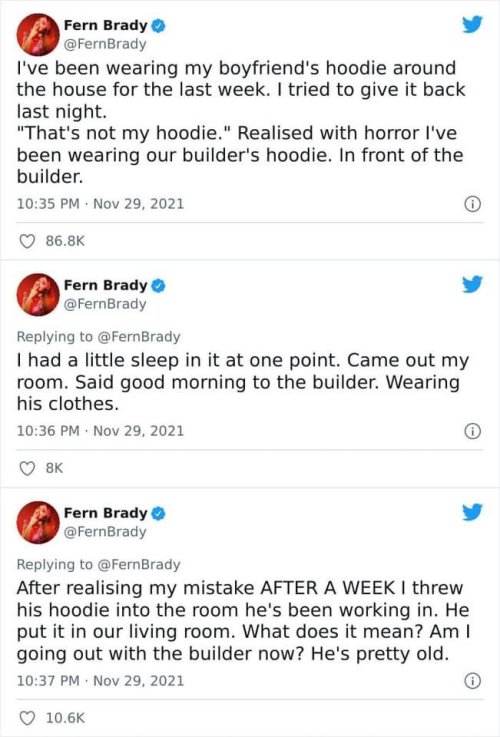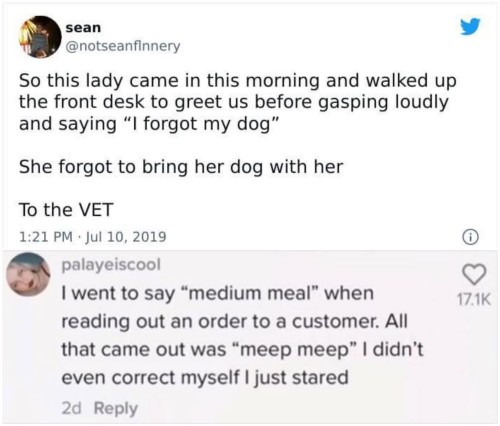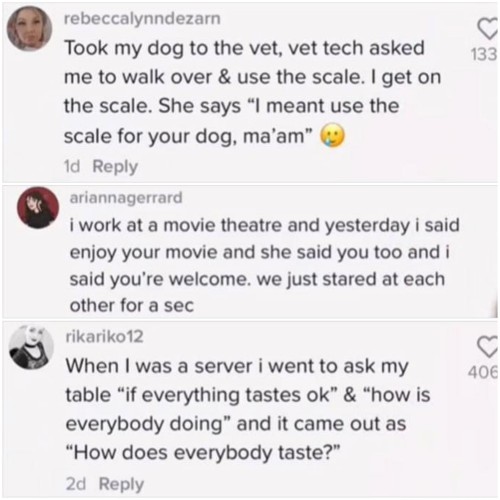This Study Session Is Powered By Coffee In My Hufflepuff Mug. Nothing Like Cramming For A Midterm!


This study session is powered by coffee in my Hufflepuff mug. Nothing like cramming for a midterm!
More Posts from Lyliana1277 and Others
Always reblog
So there's only one channel in this motel,
This morning while I was getting ready I was watching Sesame Street.
They were doing this bit where some clown was trying to wash his hands but kept washing his feet or his elbows and Elmo would go, “no mister noodle, your HANDS!” and all the tv kids would laugh.
Around the fourth or fifth time he couldn’t find his hands, I heard a grown man yell from somewhere else in the motel, “GODDAMMIT, MR. NOODLE.”
@todaysbird

Riffing off of your recent post about Jordan Peterson, what IS the difference between counselling psychology and clinical psychology? I know it’s possible to get a PhD in either, but I’m fuzzy about the differences in approach.
My current therapist is a psychiatrist who is working with me on meds and also with Cognitive Behavioural Therapy (CBT) talk therapy. I’m perfectly happy with him, but if he ever got hit by a bus or something (or simply retired at some point), I’d be in the market for a new therapist. So I ought to know the difference between clinical psychologists and counselling psychologists.
Thank you.
In practical terms, on the client end, there's very little difference. The real divisions you need to know are:
Psychiatrist: Someone who went to medical school and specialized in psychiatry; can diagnose and prescribe medication. Usually designated MD.
Psychologist/Therapist/Counsellor: Someone who has gone to graduate school and focused on psychology or clinical social work; can sometimes diagnose, but usually cannot prescribe medication.
Psychiatrists do sometimes do talk therapy! I had a psychiatrist like that once. He was great. Sadly, this is mostly going out of fashion. Because they have so much extra training, they get higher salaries; administrators who care about increasing efficiency and cutting costs will therefore change them from seeing a patient for an hour each, to seeing a patient for only 15 minutes to talk about medication, and shunt the clients to cheaper therapists for talk therapy.
Within the field of psychologists/therapists /counselors, there are approximately eleventy squillion different variations in education format, theoretical basis, research background, and bragging rights. That's where the Counselling vs Clinical division lives. However, all the fields have similar aims (helping people reduce distress and become more healthy) and similar approaches (sit in a room and talk) and they freely poach any techniques or knowledge from each other that seem useful, so there's very little intrinsic difference that you would see.
The one big difference you would see is if you needed a formal diagnosis, more than just the person who treats you going, "Yeah, looks like [fill in the blank]". This is usually only needed if you're applying to something specific, like government benefits or special education accommodations. Assessment psychologists/neuropsychologists mostly tend to focus only on assessment, which is a whole different field in itself. Because of their expertise, and that someone who provides psychotherapy with you might be somewhat biased with their own ideas of what your deal is, formal assessments are generally done by someone who is not your therapist.
Anyway. The big difference between counselling and clinical psychology is basically historical. Clinical psychologists historically descend from the workers in hospitals, asylums, and mental health clinics, who focused on people with acute mental illnesses. They worked closely with psychiatrists and emulated psychiatry's popular methods at the time (mostly Freudian psychoanalysis) and focused specifically on treating mental health as a disease. This has generally been seen as a relatively more factual and sciencey field, since it's where a lot of the research on abnormal psychology and how to treat it has happened.
Counselling psychology, meanwhile, descends historically from pastors and school counsellors—people in churches or schools with "normal populations" who were the obvious go-to people for those in emotional distress or uncertainty about their lives. Counselling focused on training people who needed the skills to help somebody grieving the loss of a loved one, or who needed to figure out what they wanted to do with their lives. It has generally thus been seen as a fuzzier, less rigorous field, and less prestigious. It's also closely entangled with Social Work, which grew out of many of the same settings and focused on helping ease the lives of people affected by society's many ills.
But they were all of them decieved, for another Ring was made—
Counselling as a field got significantly transformed by Carl Rogers, who used scientific research to see what kinds of therapy approaches helped people—and to the shock and horror of many many people, the warm and gentle approaches used in Counselling and Social Work turned out to work better than Freudian impassivity—even in Clinical populations!
Because see, the division between these fields was based on a misapprehension. A hundred years ago, or even fifty, we thought that these fields focused on significantly different groups, and it turns out that's not really true. Freudian psychotherapy in its failure state was all about impersonal disconnection, pointing out the flaws and foibles of somebody's psyche and expecting them to fix it. Using Rogers' method of treating mentally ill people like human beings, looking them face-to-face and believing in their ability to better themselves as people, actually worked! Amazing!
And also, a lot of people with mental illnesses are really good at masking, compensating, and functioning as normal enough to avoid general detection and referral to medical treatment. Anyone dealing with the "general population" is inevitably going to deal with people with profound levels of depression, anxiety, psychosis, addiction, and every other mental disorder under the sun.
Therefore, anybody practicing in either field had to learn about both, because each required the skills the other had. These days, the difference is generally more about who your grad school was founded by fifty or a hundred years ago than your training recently. Counsellors get hired by mental hospitals, and clinical psychologists work in schools.
The differences still linger in little ways, like how in the Canadian Psychological Association, there are different "sections" that each organize their own newsletters and social media groups and parties during conferences. They discuss new research and issues relating to their areas of practice. Most people belong to three or four each, since they overlap—there's Counseling and Clinical, sure, but also Black Psychology, History and Philosophy, Psychology in the Military, and so on.
So I am mostly being petty and flippant when I say I'm glad not to be on the Clinical listserv, where there is, I imagine, a "Jordan Petetson is Making us Look Bad" Quarantine Thread, which will be locked after 9000 replies with no resolution in sight.
Anyway, that's all inside baseball and not useful to you. Onto the useful stuff.
Full disclosure: What I'm about to say may be unconsciously biased by my perspective, despite my efforts not to be so, because my Master's degree in Counseling means I have significantly less professional prestige than psychologists with doctorates, especially in Clinical Psychology. However, I earnestly believe that I am paying attention to the science and speaking the truth here.
All the best evidence states that what level of education someone has, what school they learned it in, and what therapeutic technique they are applying are not good predictors for whether therapy with them will help you.
And yet, therapy undeniably does work. It's just that, for all our trying, we still struggle to put our fingers on precisely what the difference is.
You are actually in the best position to predict success, because the best metric we can find is whether you, personally, feel that your counsellor is listening to you, understands and cares about you, and is helping you reach your goals. That's literally the most important thing. Does this counsellor seem like someone you could work with?
This means it's actively useful to provide feedback as you go, like, "I don't like that idea, what if I did it this way instead?" or "No, I think you're mistaken," or "I'm uncomfortable with this." Part of counselling is absolutely about sitting with discomfort and figuring out how to handle tough stuff, but your therapist should be someone you can at least discuss the whys and wherefores of the process with. They're a navigator on a journey with you, not a commander telling you where to march.
This is me. There are so many things I can’t eat because I hate the taste. I’ve always been a picky eater. When I was 4 and 5, I wouldn’t eat any pizza with seasonings in their sauce. I also associate foods with bad experiences and can’t eat them anymore - like the time I stopped eating grilled cheese for 2 decades because a fly landed on one when I was a kid. Food is such a hard thing for me.
shoutout 2 the autistic ppl w "picky eating" about tastes. i hear a lot abt textures but rise up my taste hating tumblrinas.

‘Tis the Season
Gorgeous

“Lilac Bouquet”, so cute and kitsch! A delightful English tea with the vicar, perhaps?
I have also created a pre-order for “Great Tits!” for those who missed out yesterday and I’ll be dyeing it this afternoon for posting later in the week.
I have been struggling with depression lately, but it’s mostly related to my struggles with chronic illness and the lack of support I have from my medical providers. I need to start this aloud so I know that it’s situational and that it’s not my fault.
Also, I need a new therapist who can better acknowledge that it isn’t for my lack of trying. Having a neurotypical and abled therapist is draining and sometimes makes me feel like I’m being gaslit. And that’s not ok.
I’m looking for a new therapist but that takes time and more patience than I can sometimes muster with the US healthcare system and state insurance/Medicaid. Do not recommend the American healthcare experience, 0/10 rating, no stars.
I’m not okay right now and that has to be okay for now.
Meanwhile, on Twitter:
Brain farts, a thread










-
 that-mystrrious-gal liked this · 2 years ago
that-mystrrious-gal liked this · 2 years ago -
 35mmrex liked this · 2 years ago
35mmrex liked this · 2 years ago -
 lyliana1277 reblogged this · 2 years ago
lyliana1277 reblogged this · 2 years ago

36F.AuDHD.INFP.Hufflepuff.Taurus.Mostly crafty, neurodivergent, astrology, and random things I enjoy.
256 posts





